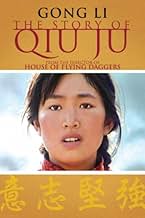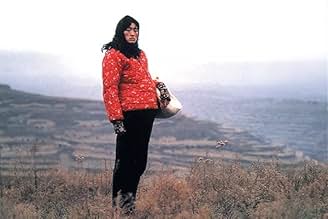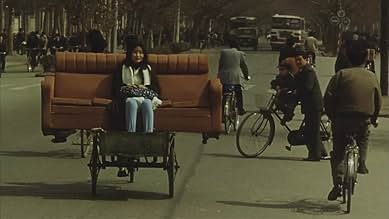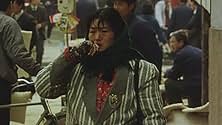PUNTUACIÓN EN IMDb
7,5/10
7 mil
TU PUNTUACIÓN
Añade un argumento en tu idiomaA peasant woman seeks justice after the headman of her village has kicked her husband in the groin.A peasant woman seeks justice after the headman of her village has kicked her husband in the groin.A peasant woman seeks justice after the headman of her village has kicked her husband in the groin.
- Premios
- 19 premios y 9 nominaciones en total
Reseñas destacadas
This is a story about saving face and winning face, and what can happen if you carry things too far. Gong Li stars as Qiu Ju, a peasant woman with child whose husband is kicked in the groin by the local chief. She wants an apology. The chief of course will not apologize since he would then lose face. Both are stubborn and obstinate. Proud and determined, Qiu Ju steers her way through the bureaucracy from the village to the district to the city; but the thing she desires, an apology from the chief, eludes her. He cannot apologize because he has only sired daughters. He has license (he believes in his heart) because he was insulted by her husband who said he raised "only hens."
The Chinese locales, from village roads to big city avenues are presented with stunning clarity so that the color and the sense of life is vivid and compelling. Director Zhang Yimou. forces us to see. From the opening shot of the mass of people in the city walking toward us (out of which emerges Qiu Ju) to the feast celebrating the child's first month of life near the end, we feel the humanity of the great mass of the Chinese people.
In a sense this is a gentle satire of the bureaucratic state that modern China has become. But Zhang Yimou emphasizes the bounty of China and not its poverty. There is a sense of abundance with the corn drying in the eaves, the sheets of dough being cut into noodles, the fat cows on the roads and the bright red chili drying in the sun. There is snow on the ground and the roads are unpaved, but there is an idyllic feeling of warmth emanating from the people. One gets the idea that fairness and tolerance will prevail.
In another sense, this is a parable about the price of things and how that differs from what is really of value. So often is price mentioned in the movie that I can tell you that a yuan at the time of the movie was worth about a dollar in its buying power. (Four and a half yuan for a "pound" of chili; five yuan as a fair price for a short cab ride; twenty yuan for a legal letter.) Getting justice in the strict sense is what Qiu Ju demands. Her affable husband would settle for a lot less. He is the wiser of the two. Notice how Qiu Ju is acutely sensitive to price. She bargains well and avoids most of the rip offs of the big city. But what is the value of being a member of the community? This is a lesson she needs to learn, and, as the movie ends, she does.
(Note: Over 500 of my movie reviews are now available in my book "Cut to the Chaise Lounge or I Can't Believe I Swallowed the Remote!" Get it at Amazon!)
The Chinese locales, from village roads to big city avenues are presented with stunning clarity so that the color and the sense of life is vivid and compelling. Director Zhang Yimou. forces us to see. From the opening shot of the mass of people in the city walking toward us (out of which emerges Qiu Ju) to the feast celebrating the child's first month of life near the end, we feel the humanity of the great mass of the Chinese people.
In a sense this is a gentle satire of the bureaucratic state that modern China has become. But Zhang Yimou emphasizes the bounty of China and not its poverty. There is a sense of abundance with the corn drying in the eaves, the sheets of dough being cut into noodles, the fat cows on the roads and the bright red chili drying in the sun. There is snow on the ground and the roads are unpaved, but there is an idyllic feeling of warmth emanating from the people. One gets the idea that fairness and tolerance will prevail.
In another sense, this is a parable about the price of things and how that differs from what is really of value. So often is price mentioned in the movie that I can tell you that a yuan at the time of the movie was worth about a dollar in its buying power. (Four and a half yuan for a "pound" of chili; five yuan as a fair price for a short cab ride; twenty yuan for a legal letter.) Getting justice in the strict sense is what Qiu Ju demands. Her affable husband would settle for a lot less. He is the wiser of the two. Notice how Qiu Ju is acutely sensitive to price. She bargains well and avoids most of the rip offs of the big city. But what is the value of being a member of the community? This is a lesson she needs to learn, and, as the movie ends, she does.
(Note: Over 500 of my movie reviews are now available in my book "Cut to the Chaise Lounge or I Can't Believe I Swallowed the Remote!" Get it at Amazon!)
Gong Li, China's top actress in the 1990s (deservedly so), plays a naive but determined innocent, a young married woman from a remote farming village who wants nothing more than to have the village elder apologize to her husband for kicking him in a fit of anger. The bureaucratic nightmare she endures, making repeated trips to "the city" to seek justice, exposes her to a system she didn't know existed, a completely convoluted and impregnable one that operates solely by standards and practices, totally devoid of compassion or an understanding of the people it governs.
This is a small film, an earlier work by master Chinese filmmaker Zhang Yimou (To Live, Ju Dou), but what really makes it work is Gong as Qiu Ju. Every effect of this effectless society registers on her face, mostly in the form of surprise at the promises unkept and disappointment at the lack of concern by officials who are supposed to be responsible to "the people." She makes us care deeply about Qiu Ju, even though we may not be able to identify directly with her circumstances, but even beyond this, she makes these provincial circumstances universal by being the everywoman, someone who just wants the people in charge to do what's right without it necessarily having any adverse impact on themselves. Gong's ability to inject political situations with sincere human emotion has made her an ideal representative of the message running through all of Zhang's films (she has appeared in several of them), but beyond this, she simply is a great actress who should eventually become as world renowned as Joan Chen once was.
What makes this film even more prescient is how well many Americans may identify with the nightmares presented by a government hierarchy overstuffed with "I just work here" bureaucrats. And the ending is infused with a poignant irony that will hit home with anyone who has, in their own lives, found that time heals all wounds.
This is a small film, an earlier work by master Chinese filmmaker Zhang Yimou (To Live, Ju Dou), but what really makes it work is Gong as Qiu Ju. Every effect of this effectless society registers on her face, mostly in the form of surprise at the promises unkept and disappointment at the lack of concern by officials who are supposed to be responsible to "the people." She makes us care deeply about Qiu Ju, even though we may not be able to identify directly with her circumstances, but even beyond this, she makes these provincial circumstances universal by being the everywoman, someone who just wants the people in charge to do what's right without it necessarily having any adverse impact on themselves. Gong's ability to inject political situations with sincere human emotion has made her an ideal representative of the message running through all of Zhang's films (she has appeared in several of them), but beyond this, she simply is a great actress who should eventually become as world renowned as Joan Chen once was.
What makes this film even more prescient is how well many Americans may identify with the nightmares presented by a government hierarchy overstuffed with "I just work here" bureaucrats. And the ending is infused with a poignant irony that will hit home with anyone who has, in their own lives, found that time heals all wounds.
Really enjoyed this one. Qiu Ju is the wife of a man who has been kicked by a neighbor, his village chief. She presses for an apology, largely (if subtitles do it justice) because, even though his chest is what hurts longer, he's been kicked in the "privates" and she wants more than one child. She takes her quest for the apology up the chain of officialdom.
I couldn't get enough of the scenery - houses, city, carts, clothes, painted paper banners, dried peppers and corn - and the faces of people. As other viewers noted positively, the people in it didn't seem to be actors but real people, caught up in daily affairs and catching us up, too. The nearby village is somewhat familiar to her, but her trip to the city may have been her first. Watching her trying to find her way around, haggling for fair rates and help from a produce buyer, a bike-cart driver, a letter writer, a hotelier, and a lawyer was a lot of fun. Her trips seemed like a great introduction to the culture.
One of the things I loved was how the families and neighbors kept having complex interactions with each other throughout the ordeal. And the social roles in this were interesting: Farm/village chief to farmer, sister to sister, daughter-in-law to her in-laws, Party officials to their hierarchy and to citizens, country to city, women's role in general (as in what sex babies are preferred) and the strong stance of a specific woman like Qiu Ju, who seemed to be empowered as much as frustrated by the system and by her family and neighbors.
I read reviews of this as a negative comment on bureaucracy. If so, it showed a remarkably humane one. Flaws were on display but the overall tone was of acceptance.
The sudden ending left me feeling for the main characters. I seemed to see a judgment in it, but wasn't sure what that judgment was. I wanted to know how the story was interpreted in China, so I came to IMDB to at least see how others took it.
I couldn't get enough of the scenery - houses, city, carts, clothes, painted paper banners, dried peppers and corn - and the faces of people. As other viewers noted positively, the people in it didn't seem to be actors but real people, caught up in daily affairs and catching us up, too. The nearby village is somewhat familiar to her, but her trip to the city may have been her first. Watching her trying to find her way around, haggling for fair rates and help from a produce buyer, a bike-cart driver, a letter writer, a hotelier, and a lawyer was a lot of fun. Her trips seemed like a great introduction to the culture.
One of the things I loved was how the families and neighbors kept having complex interactions with each other throughout the ordeal. And the social roles in this were interesting: Farm/village chief to farmer, sister to sister, daughter-in-law to her in-laws, Party officials to their hierarchy and to citizens, country to city, women's role in general (as in what sex babies are preferred) and the strong stance of a specific woman like Qiu Ju, who seemed to be empowered as much as frustrated by the system and by her family and neighbors.
I read reviews of this as a negative comment on bureaucracy. If so, it showed a remarkably humane one. Flaws were on display but the overall tone was of acceptance.
The sudden ending left me feeling for the main characters. I seemed to see a judgment in it, but wasn't sure what that judgment was. I wanted to know how the story was interpreted in China, so I came to IMDB to at least see how others took it.
When her husband insults a neighbor and is nearly 'emasculated', a peasant woman goes to great lengths to secure justice. Many people in the West may not understand why this woman is so determined to right such a 'minor' wrong. In Chinese culture, an assault on another man's "honor" is not viewed as a 'minor' thing; having children is very important and carries a greater social significance than it does in the West. It is expected of every man, and having a son, especially, to work in the fields for the good of the family and carry on the family name, has been worshipped as a Confucian ethic for centuries. China is still very much a paternalistic society (despite Communist reform),and the 'one child' policy has only reinforced the old Chinese adage that "if you bear a girl,bear a beautiful one, if you bear a son, bear an intelligent one." So understandably,from the viewpoint of Qiu Ju,not only does her husband suffer but her entire family name and honor suffers too, when the man is attacked in a 'sacred place', his gonads. The village chief, the fellow who delivered the disabling kick,has also been dishonored by the husband's insult about "having hens" and not boys. By kicking the offending man in the balls, the village chief wanted to save his face, hence the stalemate. But for Qiu Ju, and certainly in Chinese eyes, the greater wrong is the assault on her husband's reproductive organs. A delightful movie, so well acted with quite a few funny moments surrounding a serious issue. Zhang Yimou is one fine director.
The movie is a comedy, and a comedy only. Should the content go a bit deeper, it will surely be banned. In the communist system (under which I was raised), the "face" (reputation), not the truth, is supremely important. If the ruling government (or person) is portrayed by a story in any unfavorable light, the movie will simply not meet any audience except the censor review board.
In this movie, only a village cadre is selected as the bad guy, who kicked someone's private part. Then Qiu Ju, the victim's wife, went on a pilgrimage to seek justice for her husband. What if this bad guy is the mayor of a major City or higher? In that case, Qiu Ju may very likely get murdered and disappear into thin air. One person's life in China is not viewed precious like in the West. Power-play removes anyone in the way: even LIU Shao-qi, the 2nd-man in power before the Cultural Revolution of 1966, was gotten rid of because he endangered Mao's position (like to see a movie on that story, but it's guaranteed banned material in China).
Qiu Ju is admirable because she is earnest and persistent. Getting to one level without seeing justice done, she moves on. For the majority of the people in China, they would have given up. If this spirit gets into everybody in China, we will see a revolution. The student's movement in Beijing (1989) was one of such, and the result: blood shedding. Whole country learned from the incident to shut up. Where is Qiu Ju's persistence then? When will the freedom of speech (like what we enjoy at this forum) be granted in China? When will the Internet be truly open to the average Qiu Ju in China?
So to get this movie approved and circulated, the bad guy in this movie got what he deserved: put in prison, though Qiu Ju only demanded an apology from the Village-head. She would hate to find the village-head tortured in prison (Qiu Ju may not know it, but oh yes, there is severe torture in China's prisons all over the country) or even sent to labor camp where one would wither away. The truth behind this movie is: China's bureaucrats never listen to people's voice. And why would they? They are appointed at high levels, not elected. If you cannot have free speech publicly, how can you do anything according to conscience publicly?
Enjoy Qiu Ju's story and its colorful and rich portrayal of life in China, but don't follow her spirit if you are in China: you could get... (oh help... help me... someone is pulling my plug... !!!)
In this movie, only a village cadre is selected as the bad guy, who kicked someone's private part. Then Qiu Ju, the victim's wife, went on a pilgrimage to seek justice for her husband. What if this bad guy is the mayor of a major City or higher? In that case, Qiu Ju may very likely get murdered and disappear into thin air. One person's life in China is not viewed precious like in the West. Power-play removes anyone in the way: even LIU Shao-qi, the 2nd-man in power before the Cultural Revolution of 1966, was gotten rid of because he endangered Mao's position (like to see a movie on that story, but it's guaranteed banned material in China).
Qiu Ju is admirable because she is earnest and persistent. Getting to one level without seeing justice done, she moves on. For the majority of the people in China, they would have given up. If this spirit gets into everybody in China, we will see a revolution. The student's movement in Beijing (1989) was one of such, and the result: blood shedding. Whole country learned from the incident to shut up. Where is Qiu Ju's persistence then? When will the freedom of speech (like what we enjoy at this forum) be granted in China? When will the Internet be truly open to the average Qiu Ju in China?
So to get this movie approved and circulated, the bad guy in this movie got what he deserved: put in prison, though Qiu Ju only demanded an apology from the Village-head. She would hate to find the village-head tortured in prison (Qiu Ju may not know it, but oh yes, there is severe torture in China's prisons all over the country) or even sent to labor camp where one would wither away. The truth behind this movie is: China's bureaucrats never listen to people's voice. And why would they? They are appointed at high levels, not elected. If you cannot have free speech publicly, how can you do anything according to conscience publicly?
Enjoy Qiu Ju's story and its colorful and rich portrayal of life in China, but don't follow her spirit if you are in China: you could get... (oh help... help me... someone is pulling my plug... !!!)
¿Sabías que...?
- CuriosidadesThe Chinese title is "Qiu Ju Files a Lawsuit"
Selecciones populares
Inicia sesión para calificar y añadir a tu lista para recibir recomendaciones personalizadas
- How long is The Story of Qiu Ju?Con tecnología de Alexa
Detalles
Taquilla
- Recaudación en Estados Unidos y Canadá
- 1.890.247 US$
- Fin de semana de estreno en EE. UU. y Canadá
- 25.785 US$
- 18 abr 1993
- Recaudación en todo el mundo
- 1.890.247 US$
- Duración1 hora 40 minutos
- Color
- Relación de aspecto
- 1.85 : 1
Contribuir a esta página
Sugerir un cambio o añadir el contenido que falta

Principal laguna de datos
By what name was Qiu Ju, una mujer china (1992) officially released in India in English?
Responde






















